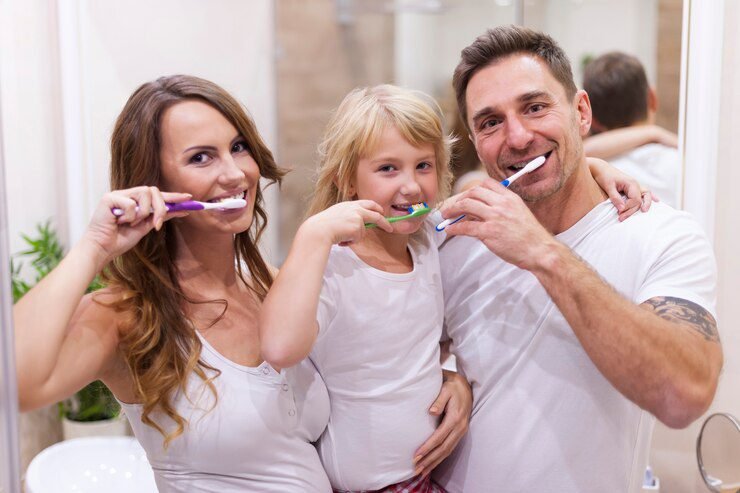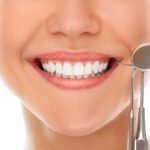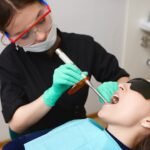Table of Contents
The Importance of Oral Hygiene During the Summer Months

Maintaining proper oral hygiene is essential all year round, but it becomes even more crucial during the summer months. With the sun shining and the temperatures rising, it’s easy to get caught up in the excitement of outdoor activities and forget about taking care of our teeth and gums. However, neglecting oral hygiene can lead to a host of dental problems that can put a damper on your summer fun.
One of the main reasons why oral hygiene is particularly important during the summer is the increased consumption of sugary treats and cold beverages. Ice cream, popsicles, and soda are all popular choices to beat the heat, but they can wreak havoc on your teeth. The sugar in these treats feeds bacteria in your mouth, leading to the formation of plaque and an increased risk of cavities. Furthermore, acidic drinks like lemonade and iced tea can erode tooth enamel, making your teeth more vulnerable to decay.
Effective Dental Care Habits for a Healthy Smile

Maintaining proper dental care habits is essential for achieving and maintaining a healthy smile. A consistent and effective oral hygiene routine can help prevent dental issues such as cavities, gum disease, and tooth loss. To ensure a healthy smile, it is important to follow a few key dental care habits.
Firstly, brushing your teeth at least twice a day is crucial for optimal oral health. This helps to remove plaque and food particles that can lead to tooth decay and gum disease. Be sure to use a soft-bristled toothbrush and fluoride toothpaste. Brush gently in circular motions for about two minutes, making sure to clean all surfaces of your teeth and along the gumline. Additionally, don’t forget to replace your toothbrush every three to four months or sooner if the bristles are frayed.
In addition to regular brushing, flossing is equally important for a healthy smile. Flossing reaches areas between the teeth where your toothbrush can’t reach, removing plaque and bacteria. It is recommended to floss at least once a day, preferably before bedtime. Slide the floss gently between your teeth and curve it around each tooth in a C shape, ensuring you clean below the gumline as well. If you find traditional floss challenging to use, consider using floss picks or a water flosser as alternatives.
Remember, effective dental care habits are the foundation for a healthy smile. By following a routine of proper brushing and flossing, you can significantly reduce your risk of dental problems and maintain a beautiful, confident smile.
Protecting Your Teeth and Gums from Summer Treats and Beverages

Summer is a time for relaxation and indulgence, but it’s important to be mindful of the impact that summer treats and beverages can have on our teeth and gums. The warm weather often brings with it a temptation for sugary snacks and refreshing drinks, but these can be detrimental to our oral health if consumed in excess.
One of the main culprits during the summer months is ice cream. While it may be a delicious way to cool down, the high sugar content in most ice creams can contribute to tooth decay. The bacteria in our mouths feed on sugars, producing acids that erode tooth enamel and lead to cavities. It’s important to enjoy ice cream in moderation and follow it up with a glass of water to rinse away any lingering sugar.
Another popular summer treat is soda, which is not only loaded with sugar but also acidic in nature. The combination of sugar and acid can wreak havoc on our teeth, causing enamel erosion and tooth sensitivity. Opting for sugar-free or low-sugar alternatives can help reduce the risk, but it’s still important to limit consumption and rinse your mouth with water after indulging in a fizzy drink. By being mindful of the treats and beverages we consume during the summer months, we can protect our teeth and gums from unnecessary damage and maintain a healthy smile.
The Role of Regular Dental Check-ups in Maintaining a Beautiful Smile
Regular dental check-ups play a crucial role in maintaining a beautiful smile. These appointments are not just about fixing any current issues or addressing immediate concerns; they are also an essential preventive measure for long-term oral health. Professional dental cleanings, X-rays, and examinations performed during these check-ups can help detect and prevent potential problems before they worsen.
During a dental check-up, your dentist will thoroughly clean your teeth, removing any plaque or tartar buildup that regular brushing and flossing may have missed. This not only keeps your smile looking radiant but also prevents the development of cavities, gum disease, and other dental issues. Additionally, your dentist will examine your mouth for signs of oral cancer, gum disease, tooth decay, and other abnormalities that may require further treatment.
Moreover, regular check-ups provide an opportunity for your dentist to track your oral health over time and develop a personalized treatment plan if necessary. By monitoring changes in your mouth and addressing any concerns promptly, you can maintain optimal oral health and preserve your beautiful smile for years to come. Remember, prevention is always better than cure when it comes to your dental health, and regular dental check-ups are a crucial component of that preventive care.
Tips for Proper Brushing and Flossing to Prevent Oral Health Issues
Proper brushing and flossing techniques are essential for maintaining good oral health and preventing dental issues. To ensure effective cleaning, it is important to follow the right techniques and use the appropriate tools.
When it comes to brushing, it is recommended to use a soft-bristled toothbrush and fluoride toothpaste. Make sure to brush your teeth at least twice a day, for two minutes each time, using gentle circular motions. Pay extra attention to all surfaces of your teeth, including the front, back, and chewing surfaces. Don’t forget to brush your tongue as well, as it can harbor bacteria and cause bad breath.
In addition to brushing, flossing plays a crucial role in removing food particles and plaque that might be hiding between your teeth. Use a dental floss or interdental cleaner to clean between each tooth, making sure to go beneath the gumline. Gently glide the floss back and forth, and curve it around each tooth in a C-shape. Be cautious not to snap the floss or force it, as it can harm your gums. Aim to floss at least once a day to maintain optimal oral hygiene.
By implementing these proper brushing and flossing techniques into your daily routine, you can effectively prevent oral health issues and maintain a healthy smile. Remember, it is always advisable to consult with your dentist or dental hygienist for personalized tips and recommendations that suit your specific oral health needs.
Here are some tips for proper brushing and flossing to prevent oral health issues:
| Tips for Proper Brushing and Flossing | Guidelines |
|---|---|
| 1. Brush Twice a Day | – Brush your teeth at least twice a day, preferably after meals and before bedtime, using fluoride toothpaste. |
| 2. Use the Right Technique | – Hold your toothbrush at a 45-degree angle to your gums and use gentle, circular motions to brush all tooth surfaces. |
| – Pay special attention to the gumline, back teeth, and hard-to-reach areas. | |
| 3. Brush for at Least Two Minutes | – Brush for a minimum of two minutes each time to ensure thorough cleaning of all tooth surfaces. |
| – Use a timer or an electric toothbrush with a built-in timer to help you brush for the recommended duration. | |
| 4. Don’t Forget Your Tongue and Roof of Your Mouth | – Gently brush your tongue and the roof of your mouth to remove bacteria and freshen breath. |
| 5. Choose the Right Toothbrush | – Use a soft-bristled toothbrush with a small head to reach all areas of your mouth easily without causing damage to your gums or enamel. |
| – Replace your toothbrush or toothbrush head every three to four months, or sooner if bristles become frayed. | |
| 6. Floss Daily | – Floss your teeth at least once a day to remove plaque and food particles from between teeth and along the gumline. |
| – Use a gentle back-and-forth motion, avoiding snapping the floss, which can cause gum irritation. | |
| 7. Consider Using Interdental Brushes or Water Flossers | – If traditional flossing is difficult, consider using interdental brushes or water flossers as alternative cleaning methods. |
| – These tools can help remove plaque and debris from between teeth and are especially useful for people with braces or dental work. | |
| 8. Rinse with Mouthwash | – Rinse with an antimicrobial mouthwash after brushing and flossing to kill bacteria and freshen breath. |
| – Choose a mouthwash containing fluoride for added protection against cavities. | |
| 9. Maintain a Balanced Diet | – Eat a balanced diet rich in fruits, vegetables, lean proteins, and whole grains to support overall oral health and prevent tooth decay. |
| – Limit sugary and acidic foods and beverages, which can contribute to tooth decay and erosion. | |
| 10. Visit Your Dentist Regularly | – Schedule regular dental check-ups and cleanings every six months or as recommended by your dentist. |
| – Professional cleanings and exams can help detect and prevent oral health issues before they become serious problems. |
Choosing the Right Toothpaste and Mouthwash for Optimal Dental Health
When it comes to maintaining optimal dental health, choosing the right toothpaste and mouthwash is crucial. With so many options available on the market, it can be overwhelming to know which products are best suited for your individual needs. However, by understanding what to look for in toothpaste and mouthwash, you can make informed decisions that will promote a healthy and beautiful smile.
First and foremost, it’s important to select a toothpaste that contains fluoride. Fluoride is a mineral that helps to strengthen tooth enamel, making it more resistant to decay. Look for toothpaste that has been approved by dental associations and bear the ADA (American Dental Association) seal of approval. This seal ensures that the product has met specific quality standards and has been thoroughly tested for safety and effectiveness. Additionally, consider your individual oral health needs when selecting a toothpaste. If you have sensitive teeth, there are toothpaste options available that can help to alleviate discomfort and reduce sensitivity. On the other hand, if you are prone to gum disease, there are toothpastes specifically formulated to combat gingivitis and protect against tartar buildup.
Similarly, when choosing a mouthwash, consider your unique oral health concerns. Mouthwash can be a valuable addition to your oral hygiene routine as it can help to kill bacteria, freshen breath, and reach areas of the mouth that may be missed during brushing and flossing. Look for a mouthwash that contains ingredients such as antimicrobial agents like chlorhexidine, which can help to reduce plaque and gingivitis. Alcohol-free mouthwashes are also available for those who may have sensitivity to alcohol or dry mouth. As with toothpaste, it’s important to choose a mouthwash that is ADA-approved to ensure its safety and effectiveness.
By carefully selecting the right toothpaste and mouthwash for your individual needs, you can enhance your oral hygiene routine and maintain optimal dental health. Remember to consult with your dentist for personalized recommendations and to address any specific concerns or conditions you may have. With a proactive approach and the right oral care products, you can enjoy a healthy and beautiful smile for years to come.
How to Safely Whiten Your Teeth for a Brighter Smile
Teeth whitening has become a popular cosmetic dental procedure for those seeking a brighter smile. However, it is crucial to approach this process with caution to ensure its safety and effectiveness. So, how can you safely whiten your teeth for a brighter smile?
First and foremost, it is essential to consult with a dental professional before attempting any teeth whitening methods. They will evaluate your oral health and determine the most appropriate whitening technique for you. While over-the-counter whitening products may seem tempting, they may not provide the desired results or could even harm your teeth if used improperly.
Professional teeth whitening procedures, such as in-office treatments or take-home kits prescribed by your dentist, are often the safest and most effective options. These methods use higher concentrations of whitening agents and are supervised by dental professionals, minimizing the risk of adverse effects. Additionally, your dentist can tailor the treatment to your specific needs, considering factors like the level of discoloration and sensitivity of your teeth.
When it comes to whitening your teeth, patience is key. It is important to follow the instructions provided by your dentist or the product manufacturer diligently. Overusing whitening products or leaving them on for longer than recommended can lead to tooth sensitivity, gum irritation, or even damage to the enamel.
Maintaining good oral hygiene is also vital during the whitening process. Brushing your teeth twice a day with a fluoride toothpaste and flossing daily will help keep your teeth clean and reduce the risk of staining. Additionally, avoiding tobacco products, excessive consumption of staining agents like coffee or red wine, and practicing moderation with acidic or sugary foods can prolong the results of your teeth whitening treatment.
Remember, achieving a brighter smile takes time and commitment. By consulting with a dental professional and following their guidance, you can safely whiten your teeth and enjoy the benefits of a confident, radiant smile.
The Dangers of Excessive Sun Exposure on Oral Health
Excessive sun exposure can have detrimental effects on your oral health. Although we often think about protecting our skin from the sun’s harmful rays, it’s important to remember that our mouths are also susceptible to sun damage. Sunburned lips, for example, can be incredibly painful and increase the risk of developing oral health issues.
The skin on our lips is thinner and more delicate compared to the rest of our body, making it more susceptible to sunburn. Prolonged exposure to the sun without proper protection can lead to dry, chapped lips, blistering, and even cold sores. Additionally, the sun’s harmful ultraviolet (UV) radiation can damage the DNA in the cells of our lips, increasing the risk of developing lip cancer. It is crucial to protect our lips by applying lip balm with at least SPF 30 to prevent sunburn and reduce the risk of long-term damage.
Furthermore, excessive sun exposure can also affect the soft tissues inside our mouths. The harmful UV rays can damage the cells in the mucous membranes, leading to inflammation and an increased risk of oral cancers. It is essential to remember that our mouth is an entryway for harmful UV radiation, and neglecting to protect it can have severe consequences. Using a lip balm with a high SPF, wearing a wide-brimmed hat, and seeking shade during the sun’s peak hours are simple but effective ways to safeguard your oral health from excessive sun exposure.
Maintaining Proper Hydration for a Healthy Mouth and Body
Proper hydration is essential for maintaining both a healthy mouth and body, especially during the summer months. Water is not only important for quenching thirst but also plays a crucial role in preventing oral health issues such as dry mouth and bad breath. When we are dehydrated, our saliva production decreases, leading to a dry oral environment that can promote the growth of bacteria.
In addition to saliva production, proper hydration helps to maintain the overall health of our bodies. Our bodies are composed of approximately 60% water, and it is involved in numerous physiological processes, such as digestion, nutrient absorption, temperature regulation, and waste removal. Without sufficient hydration, these processes can be hindered, impacting our overall well-being.
To ensure proper hydration, it is recommended to drink an adequate amount of water throughout the day. The Institute of Medicine suggests a daily intake of about 3.7 liters (or roughly 13 cups) for men and 2.7 liters (or about 9 cups) for women. However, individual hydration needs can vary based on factors such as age, activity level, climate, and overall health. It is important to listen to your body’s signals and drink water whenever you feel thirsty to maintain adequate hydration levels. Additionally, limiting the consumption of sugary beverages and alcohol can help to prevent oral health issues and promote overall hydration.
Remember, staying properly hydrated is not just important for quenching your thirst but also for maintaining a healthy mouth and body. By prioritizing hydration, you can ensure that both your oral and overall health are in optimal condition, allowing you to enjoy a bright and beautiful smile all summer long.
The Link Between Nutrition and a Beautiful Smile
Proper nutrition plays a crucial role in maintaining a beautiful smile. The foods we eat not only impact our overall health but also the health of our teeth and gums. A well-balanced diet rich in vitamins and minerals is essential for optimal oral health.
First and foremost, calcium is a key nutrient for strong teeth. It helps to strengthen tooth enamel and prevent tooth decay. Dairy products such as milk, cheese, and yogurt are excellent sources of calcium. Additionally, leafy green vegetables like spinach and kale, as well as almonds and salmon, are also rich in calcium.
Another vital nutrient for a healthy smile is vitamin C. This powerful antioxidant helps to promote gum health and prevent gum disease. Citrus fruits like oranges, strawberries, and kiwi are excellent sources of vitamin C. Other fruits and vegetables such as peppers, broccoli, and tomatoes also contain this important vitamin.
Incorporating these nutritious foods into your diet can greatly improve your oral health and contribute to a beautiful smile. However, it is important to remember that proper oral hygiene practices, such as regular brushing and flossing, are equally essential for maintaining optimal dental health.
Preventing Teeth Grinding and Jaw Clenching during Stressful Summer Months
Teeth grinding, also known as bruxism, and jaw clenching are common dental issues that can occur during stressful periods, including the summer months. These habits not only pose a risk to the health of your teeth and jaw, but they can also disrupt your sleep and overall well-being. Fortunately, there are steps you can take to prevent these behaviors and safeguard your oral health.
First and foremost, it is important to identify and address the underlying causes of teeth grinding and jaw clenching. Stress, anxiety, and even certain medical conditions can contribute to these habits. Engaging in stress-reducing activities such as exercise, meditation, or therapy can help alleviate these triggers and prevent bruxism. Additionally, establishing a relaxing bedtime routine and creating a calm sleep environment can promote restful sleep and reduce the likelihood of teeth grinding during the night.
In addition to stress management, maintaining good oral hygiene practices can also play a role in preventing teeth grinding. Regular brushing and flossing remove plaque and tartar buildup, reducing the risk of tooth damage and jaw strain. Furthermore, wearing a custom-fit mouthguard can provide a protective barrier between the upper and lower teeth, cushioning the impact of grinding and clenching. Consulting with your dentist and discussing your symptoms can help determine the most suitable treatment plan for your specific needs.
By taking proactive steps to address stress and maintain a healthy oral hygiene routine, you can effectively prevent teeth grinding and jaw clenching during the often hectic summer months. Prioritizing your oral health not only ensures the longevity of your teeth and gums, but it can also contribute to your overall well-being.
The Benefits of Wearing a Mouthguard during Summer Outdoor Activities
Wearing a mouthguard during summer outdoor activities is essential for maintaining good oral health and preventing dental injuries. Whether you’re engaging in high-impact sports or recreational activities, a mouthguard can provide significant benefits in protecting your teeth, gums, and overall oral cavity.
One of the primary benefits of wearing a mouthguard is its ability to act as a cushion and absorb the impact of a blow to the face or mouth. This is especially crucial during activities such as basketball, soccer, or cycling, where accidental collisions are common. By distributing the force evenly, a mouthguard helps to reduce the risk of tooth fractures, chips, and even complete tooth loss. Additionally, it can protect the soft tissues of the mouth, such as the gums, lips, and cheeks, from lacerations and abrasions that may result from an unexpected impact.
Moreover, wearing a mouthguard can also help prevent more severe injuries like jaw fractures or concussions. The protective barrier created by a mouthguard reduces the impact transmitted to the jaw joint, minimizing the risk of fractures and providing stability. It also acts as a shock absorber, lessening the force transferred to the skull during a traumatic event. These benefits make a mouthguard an invaluable tool in avoiding both immediate and long-term oral and facial injuries.
Not only does a mouthguard protect your teeth and jaw, but it also safeguards your investment in orthodontic treatment. For individuals with braces or other orthodontic appliances, wearing a mouthguard is even more crucial. It provides an additional layer of protection, preventing any damage to the brackets, wires, or other components of the orthodontic treatment. This ensures that you can continue your treatment smoothly and effectively, without any unexpected setbacks or interruptions.
By prioritizing the use of a mouthguard during summer outdoor activities, you’re taking proactive steps to safeguard your oral health and prevent unnecessary dental trauma. Investing in a high-quality mouthguard that fits properly and is designed for the specific activity you’ll be participating in is a small price to pay for the enormous benefits it provides. So, before you hit the field, court, or track this summer, make sure to include a mouthguard as an essential part of your sports gear. Your teeth, jaw, and overall well-being will thank you for it.
Tips for Maintaining Good Oral Health Habits While Traveling This Summer
Maintaining good oral health habits while traveling this summer is essential to ensure the well-being of your teeth and gums even when you’re away from home. Traveling often disrupts our routines, making it easy to neglect oral hygiene practices. However, neglecting oral health can lead to various dental issues such as cavities, gum disease, and bad breath. To avoid these problems and keep your smile healthy while on the go, here are some tips to incorporate into your travel routine.
Firstly, always remember to pack your oral hygiene essentials. This includes a toothbrush, toothpaste, and dental floss. Opt for a travel-sized toothbrush and toothpaste that comply with airline regulations if you’re flying. Additionally, consider packing a portable water flosser or interdental brushes for a thorough clean between teeth. By having these essentials at hand, you won’t have an excuse to skip your oral care routine, regardless of your destination.
Next, make it a priority to brush your teeth at least twice a day, as you would at home. Brushing your teeth should be done for a minimum of two minutes, using a toothbrush with soft bristles and a fluoride toothpaste. Be mindful of brushing all surfaces of your teeth, including the back molars and along the gumline. This will help remove plaque and prevent the buildup of harmful bacteria. Remember, maintaining your oral health habits while traveling will go a long way in ensuring a healthy and beautiful smile throughout your summer adventures.
How often should I brush my teeth while traveling?
It is recommended to brush your teeth at least twice a day while traveling, just like you would at home.
Can I use a travel-sized toothbrush and toothpaste?
Yes, using a travel-sized toothbrush and toothpaste is convenient and can help you maintain good oral health while on the go.
Should I floss while traveling?
Absolutely! Flossing is an essential part of maintaining good oral health, so remember to pack some floss or dental floss picks for your trip.
How can I protect my teeth from the sugary treats and beverages often consumed during summer vacations?
It’s important to limit the consumption of sugary treats and beverages. When indulging, Rinse your mouth with water after consuming sugary foods or drinks and try to brush your teeth 30 minutes later.
Are regular dental check-ups necessary even during the summer months?
Yes, regular dental check-ups are necessary regardless of the season. It is recommended to schedule a dental check-up before or after your trip to ensure your oral health is in good condition.
How can I prevent teeth grinding and jaw clenching during stressful summer months?
To prevent teeth grinding and jaw clenching, try practicing stress management techniques such as deep breathing exercises, yoga, or meditation. If necessary, consult your dentist for a nightguard or splint.
Is it important to wear a mouthguard during summer outdoor activities?
Yes, wearing a mouthguard during summer outdoor activities such as sports or recreational activities can protect your teeth from potential injuries or accidents.
Can excessive sun exposure affect my oral health?
Excessive sun exposure can lead to lip damage, including sunburn and potential oral health issues. It is recommended to protect your lips with a lip balm containing SPF and seek shade when the sun is at its strongest.
How does nutrition affect my oral health?
Nutrition plays a significant role in maintaining a healthy smile. A balanced diet rich in vitamins and minerals, particularly calcium and vitamin D, can promote strong teeth and gums.
Is it safe to whiten my teeth while traveling?
It is generally recommended to consult with your dentist before whitening your teeth, but if you decide to whiten your teeth while traveling, make sure to follow the instructions carefully and use a reputable whitening product.
How can I maintain proper hydration for a healthy mouth and body while traveling?
Drink plenty of water throughout the day to stay hydrated, which not only benefits your overall health but also helps maintain a moist mouth and prevent dry mouth.
How can I choose the right toothpaste and mouthwash for optimal dental health?
Look for toothpaste and mouthwash that contain fluoride, as it helps prevent tooth decay and strengthens enamel. Your dentist can also recommend specific products based on your oral health needs.




